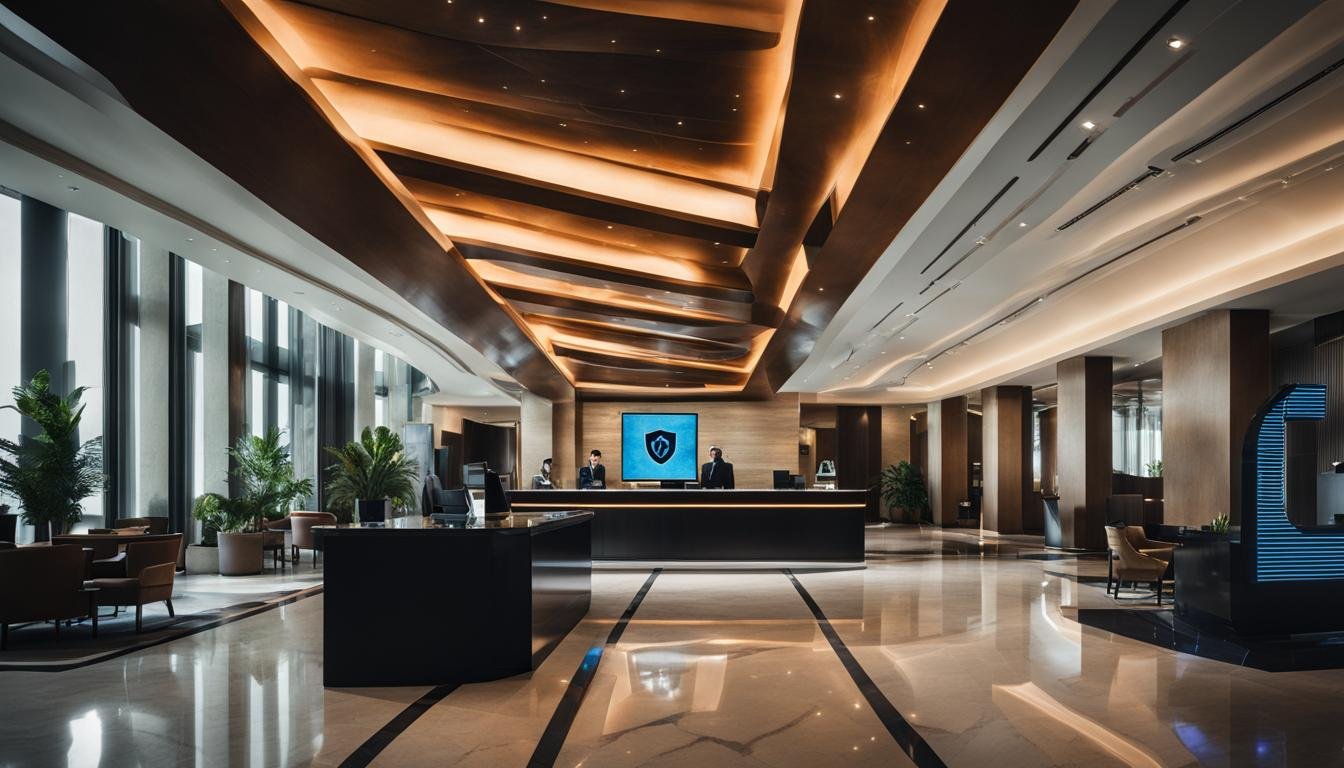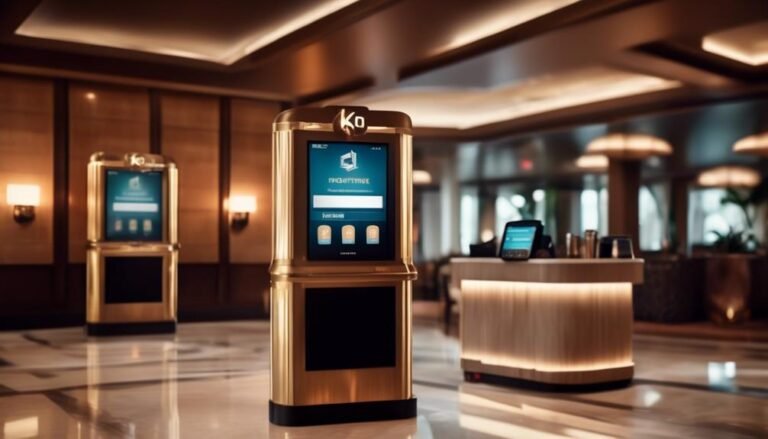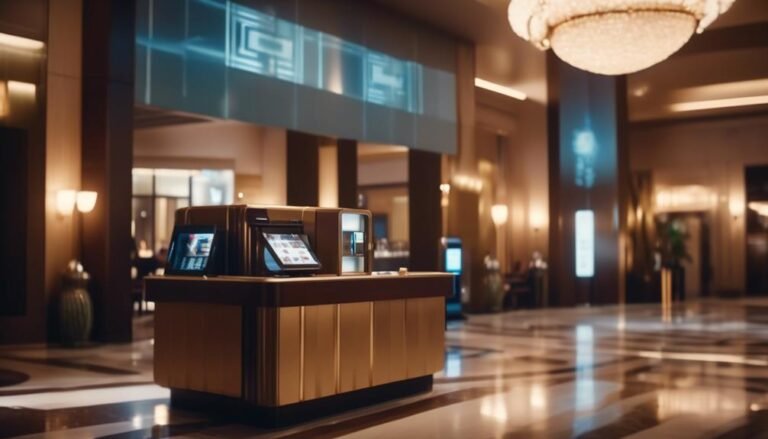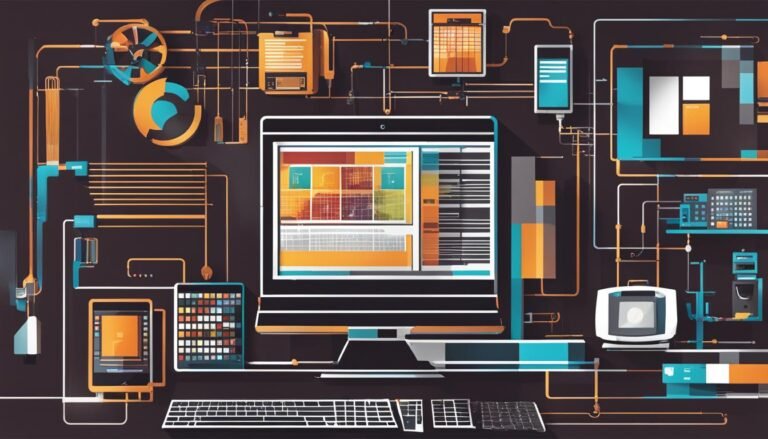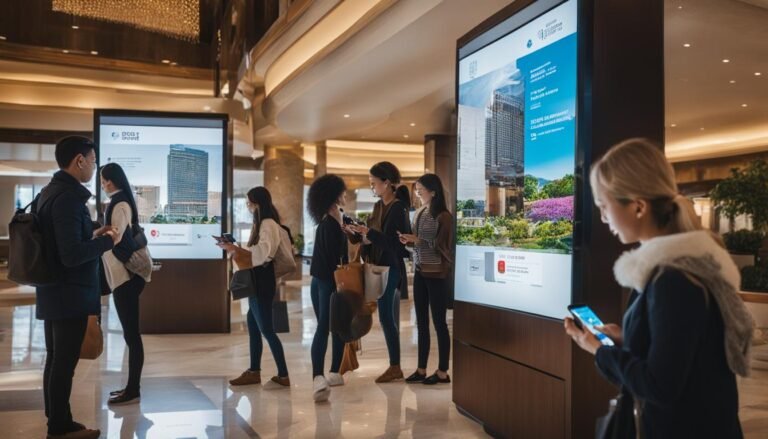Cybersecurity Best Practices for Hotels
Protecting guest data privacy and ensuring secure hotel operations are of utmost importance in the digital age. With the increasing prevalence of cyber threats, hotels must implement effective cybersecurity measures to safeguard their guests’ personal information. From encryption and employee training to regular updates and layered security, here are some best practices that hotels should consider to protect themselves and their guests.
Key Takeaways:
- Implementing cybersecurity measures is crucial for protecting guest data privacy and securing hotel operations.
- Hotels face a high risk of cybersecurity breaches due to the sensitive information they store.
- Encryption of data and regular backups are essential to prevent unauthorized access and recover from incidents.
- Employee training plays a critical role in raising awareness and preventing cyber attacks.
- A layered security approach, including firewalls and antivirus software, strengthens the hotel’s defenses.
Importance of Cybersecurity in the Hospitality Industry
The hospitality industry, with its vast amount of customer information and financial transactions, is a prime target for cybercriminals. Data breaches in the industry have become increasingly prevalent, with 89% of hospitality companies experiencing at least one breach. These breaches not only result in financial losses but also expose hotels to massive fines and potential legal action due to their failure to protect customer information. As a result, it has become essential for hotels to prioritize cybersecurity measures to safeguard sensitive data and maintain the trust of their guests.
The hospitality industry’s unique characteristics make it an attractive target for hackers. Hotels collect and store a wealth of personal data, including credit card numbers, contact information, and travel itineraries, making them vulnerable to cyber attacks. With the growing sophistication of cybercriminals and the increasing frequency of data breaches, hotels cannot afford to overlook the importance of robust cybersecurity practices.
By investing in cybersecurity measures, hotels can protect themselves against data breaches, financial losses, and reputational damage. Implementing strong security protocols, such as encryption of customer data, regular employee training, penetration testing, and the use of firewalls and antivirus software, can significantly reduce the risk of cyber attacks. Furthermore, adopting a layered security approach, which combines multiple security measures, can provide a comprehensive defense against emerging threats.
Table: The Impact of Cybersecurity Breaches in the Hospitality Industry
| Type of Impact | Statistics |
|---|---|
| Financial Losses | An average data breach in the hospitality industry costs $3.86 million. |
| Fines and Legal Consequences | Hotels can face fines of up to $20 million or 4% of global annual turnover for non-compliance with data protection regulations. |
| Damage to Reputation | 72% of customers would avoid a hotel that has experienced a data breach. |
| Loss of Customer Trust | After a data breach, 82% of customers report being less likely to do business with the affected hotel. |
The hospitality industry must recognize the importance of cybersecurity and take proactive steps to protect customer information and secure their operations. By implementing effective cybersecurity measures, hotels can mitigate the risk of data breaches, financial losses, and reputational damage, ensuring the long-term success of their businesses and maintaining the trust of their guests.
Encryption of Data in Hotels
In today’s digital age, data protection is of utmost importance for hotels. One key cybersecurity practice that hotels should implement is encryption. Encryption is the process of encoding data with a key, making it unreadable to unauthorized individuals. By encrypting sensitive information, hotels can ensure that even if a cybersecurity breach occurs, the data remains secure and inaccessible to hackers.
Encryption plays a crucial role in safeguarding personal information in the event of a cybersecurity breach. Hotels deal with a vast amount of personal data, including credit card details, passport information, and guest profiles. If this information falls into the wrong hands, it can lead to identity theft, financial loss, and reputational damage. Implementing robust encryption protocols ensures that even if hackers gain access to the data, it is rendered useless without the decryption key.
“Encryption is like a secret code that protects your data from prying eyes. It ensures that the information remains confidential, even if it falls into the wrong hands.”
Encrypting data also helps hotels comply with data protection regulations, such as the General Data Protection Regulation (GDPR) and the California Consumer Privacy Act (CCPA). These regulations require businesses to take measures to protect personal data, and encryption is recognized as a critical security measure.
Table: Benefits of Data Encryption in Hotels
| Benefits | Description |
|---|---|
| Enhanced Security | Encryption ensures that data remains secure, even in the event of a breach. |
| Compliance with Regulations | Encryption helps hotels meet data protection regulations and avoid legal consequences. |
| Customer Trust | Implementing encryption demonstrates a commitment to protecting guest information, building trust among customers. |
| Reputation Protection | By safeguarding data through encryption, hotels mitigate the risk of reputational damage resulting from data breaches. |
In conclusion, encryption is an essential cybersecurity practice for hotels to protect sensitive customer information and comply with data protection regulations. By encrypting data, hotels can enhance security, build customer trust, and safeguard their reputation. Implementing robust encryption protocols should be a priority for all hotels in today’s interconnected world.
Employee Training for Cybersecurity
In today’s digital age, employee training plays a crucial role in fortifying a hotel’s cybersecurity defenses. With the increasing sophistication of cyber threats, it is essential to educate hotel staff about cybersecurity awareness, phishing attacks, and malware. By providing comprehensive training, hotels can empower their employees to be the first line of defense against cybercriminals.
One of the key focuses of employee training should be cybersecurity awareness. By increasing employees’ knowledge of common cyber threats and attack vectors, hotels can significantly reduce the risk of successful attacks. Training sessions can cover topics such as identifying suspicious emails, recognizing phishing attempts, and understanding the importance of not clicking on unknown links or downloading attachments from untrusted sources.
Another critical aspect of employee training is educating staff about the dangers of malware. Employees should be trained to recognize signs of malware infection and know how to report any suspicious activity promptly. Additionally, they should be educated on the importance of regularly updating antivirus software and ensuring that all devices, including mobile phones and tablets, are protected.
To reinforce the training, hotels can also conduct simulated phishing exercises. These exercises involve sending mock phishing emails to employees to test their awareness and response. These exercises not only help identify areas for improvement but also serve as a reminder to employees of the importance of remaining vigilant and practicing good cybersecurity habits.
Employee Training Checklist:
- Provide comprehensive training on cybersecurity awareness, including recognizing phishing attacks and avoiding suspicious emails.
- Highlight the importance of regular software updates and antivirus protection.
- Conduct simulated phishing exercises to reinforce awareness and response skills.
- Encourage employees to report any suspicious activity or potential security threats promptly.
Penetration Testing for Hotels
Penetration testing is a crucial practice for hotels to ensure the security and integrity of their cybersecurity infrastructure. By conducting regular vulnerability assessments, hotels can identify potential weaknesses in their systems and address them before cyber attackers can exploit them. Penetration testing involves simulating real-world attacks to evaluate the effectiveness of existing security measures and identify areas that require improvement.
During a penetration test, security professionals employ a variety of techniques to gain unauthorized access to systems, networks, and applications. This allows them to evaluate the effectiveness of the hotel’s security controls and identify vulnerabilities that could be exploited by malicious actors. By proactively identifying and addressing these vulnerabilities, hotels can significantly reduce the risk of cybersecurity breaches and protect sensitive guest data.
Penetration testing helps hotels stay one step ahead of cyber attackers and ensures the continuous improvement of their cybersecurity defenses. By simulating real-world attack scenarios, hotels can identify and remediate vulnerabilities before they are targeted by hackers. This proactive approach to cybersecurity helps hotels maintain guest trust, protect their reputation, and comply with industry regulations regarding data protection.
| Benefits of Penetration Testing for Hotels |
|---|
| Identify vulnerabilities in the cybersecurity infrastructure |
| Evaluate the effectiveness of existing security controls |
| Address weaknesses before they can be exploited |
| Protect sensitive guest data and maintain guest trust |
| Ensure compliance with industry regulations |
The Role of Third-Party Penetration Testing
Hotels can benefit from engaging third-party cybersecurity firms to perform penetration testing. These external experts bring a fresh perspective and specialized knowledge to assess the hotel’s security posture. Third-party penetration testing offers an unbiased evaluation of the hotel’s cybersecurity infrastructure and provides valuable insights into potential vulnerabilities and areas for improvement.
Furthermore, third-party penetration testing helps hotels address any blind spots or gaps in their internal cybersecurity processes. These firms possess extensive experience in identifying vulnerabilities and can offer targeted recommendations to enhance the hotel’s security measures. Engaging a third-party cybersecurity firm also demonstrates a commitment to cybersecurity best practices, which can give guests and stakeholders added confidence in the hotel’s data protection capabilities.
In conclusion, penetration testing is an essential practice for hotels to ensure the security of their cybersecurity infrastructure. By conducting regular vulnerability assessments, hotels can identify and address weaknesses before they can be exploited by cyber attackers. Engaging third-party cybersecurity firms can provide valuable insights and enhance the hotel’s overall security posture. By prioritizing penetration testing, hotels can protect sensitive guest data, maintain guest trust, and stay ahead of evolving cyber threats.
Strong Password Practices in Hotels
In today’s digital landscape, strong password practices are essential for hotels to ensure cybersecurity protocols and enhance account security. As cyber threats continue to evolve, hotels must prioritize the implementation of effective password policies to safeguard sensitive information and protect against unauthorized access.
Creating strong passwords is the first line of defense against hackers and unauthorized individuals. Hotels should encourage guests, employees, and administrators to use unique passwords that are a combination of letters, numbers, and special characters. It is crucial to avoid easily guessable passwords such as “123456” or “password,” as these can be easily compromised.
H3: The Importance of Regular Password Updates
Regular password updates are equally important to maintain account security. Hotels should enforce password expiration policies that require users to change their passwords at regular intervals. This practice helps prevent the prolonged use of the same password, reducing the risk of unauthorized access to hotel systems and data.
H3: Two-Factor Authentication (2FA)
In addition to strong passwords, hotels can enhance account security with the implementation of two-factor authentication (2FA). 2FA adds an extra layer of protection by requiring users to provide a second form of verification, such as a unique code sent to their mobile device, in addition to their password. This significantly reduces the likelihood of unauthorized access, even if a password is compromised.
By implementing strong password practices, regularly updating passwords, and considering additional security measures like two-factor authentication, hotels can significantly enhance their cybersecurity protocols and protect against potential threats.
Regular Software and System Updates for Hotels
Regular software and system updates play a crucial role in maintaining strong cybersecurity for hotels. These updates are essential for patching vulnerabilities and addressing security flaws that may exist in the hotel’s systems and software. By keeping their systems up to date, hotels can significantly reduce the risk of cyber attacks and protect sensitive guest data.
One of the key benefits of regular updates is the prevention of known vulnerabilities from being exploited by hackers. Cyber attackers often target outdated software and systems that have not received the latest security patches. By promptly applying updates, hotels can stay ahead of potential threats and ensure that their networks and databases remain secure.
A comprehensive patch management system is necessary for effectively implementing regular software and system updates. This system automates the process of identifying, downloading, and installing updates, making it easier for hotels to stay on top of the latest security measures. It is important for hotels to establish a regular schedule for updates to ensure that no critical patches are missed.
When it comes to software and system updates, prevention is key. By proactively addressing vulnerabilities and staying up to date with the latest security measures, hotels can create a strong defense against cyber threats and minimize the risk of data breaches or other cybersecurity incidents.
Key Takeaways
- Regular software and system updates are crucial for maintaining strong cybersecurity in hotels.
- Updates patch vulnerabilities and address security flaws that may exist in the hotel’s systems and software.
- Regular updates help prevent known vulnerabilities from being exploited by hackers.
- A comprehensive patch management system is necessary to automate the process of applying updates.
- Regular updates contribute to a proactive approach in cybersecurity, minimizing the risk of data breaches.
Layered Security Approach for Hotels
Hotels should adopt a layered security approach to protect against cyber attacks. By implementing multiple layers of security measures, hotels can strengthen their cybersecurity defenses and mitigate the risk of attacks from various sources.
Antivirus Protection
One crucial layer of security is antivirus protection. Hotels should ensure that all devices, including computers, servers, and mobile devices, are equipped with reliable antivirus software. This software helps to detect and remove malware, viruses, and other malicious programs that could compromise the security of hotel systems and data.
Firewalls
Another important layer of protection is the use of firewalls. Hotels should have firewalls installed on their networks to monitor and control incoming and outgoing network traffic. Firewalls act as a barrier between the hotel’s internal network and the external internet, screening out potential threats and unauthorized access attempts.
Strong Passwords
Implementing strong password practices is another essential aspect of a layered security approach. Hotels should require employees to create and use strong, unique passwords for their accounts. Strong passwords should include a combination of letters (both uppercase and lowercase), numbers, and special characters. Regular password changes should also be enforced to reduce the risk of unauthorized access.
Regular Updates
Regular updates to software, operating systems, and applications are crucial to maintaining a secure hotel environment. Hotels should implement a patch management system to automate the process of updating software and systems. This helps to address any known vulnerabilities and minimize the risk of exploitation by cybercriminals.
Employee Training
Lastly, employee training is a vital component of a layered security approach. Hotels should provide comprehensive cybersecurity awareness training to all employees, emphasizing the importance of identifying and reporting potential threats such as phishing attacks and social engineering attempts. Regular training sessions help employees stay vigilant and play an active role in maintaining the hotel’s cybersecurity defenses.
| Layer | Description |
|---|---|
| Antivirus Protection | Install reliable antivirus software on all devices to detect and remove malware. |
| Firewalls | Use firewalls to monitor and control network traffic, protecting against unauthorized access. |
| Strong Passwords | Enforce the use of strong, unique passwords to prevent unauthorized access to accounts. |
| Regular Updates | Implement patch management systems to ensure software and systems are up to date. |
| Employee Training | Provide comprehensive cybersecurity awareness training to all staff members. |
Data Backups for Hotels
In an era where data breaches and cyberattacks are becoming increasingly common, hotels must prioritize the implementation of robust data backup protocols to ensure the security and continuity of their operations. Regular data backups are crucial for hotels to protect against system failures, cybersecurity incidents, and data loss. By performing automated or manual backups and storing them in secure locations separate from the main system, hotels can mitigate the impact of potential emergencies and expedite the recovery process.
Data backups serve as a safety net, providing a copy of critical information that can be restored in the event of a cyber incident or any other unforeseen circumstances that may compromise the integrity or accessibility of data. It is essential for hotels to establish comprehensive backup protocols that specify the frequency of backups, the types of data to be backed up, and the mechanisms for verifying the integrity of the backed-up data.
While data backups are a crucial aspect of cybersecurity, it is equally important to regularly test the restoration of these backups to ensure their effectiveness. Hotels should conduct periodic tests to verify the integrity of the backup files and confirm that the data can be successfully retrieved and restored. By performing these tests, hotels can identify any potential issues or gaps in the backup process and address them proactively.
| Benefits of Regular Data Backups for Hotels |
|---|
| 1. Protection against data loss |
| 2. Minimization of downtime in case of system failures |
| 3. Compliance with data protection regulations |
| 4. Facilitation of data recovery and business continuity |
Implementing regular data backups and maintaining secure storage of these backups is an essential cybersecurity best practice for hotels. By prioritizing data backup protocols and conducting regular tests, hotels can ensure the protection and availability of critical information, safeguarding their operations and maintaining the trust of their guests.
Firewall and Antivirus Software for Hotel Networks
When it comes to protecting hotel networks from cyber threats, two essential tools that should be implemented are firewalls and antivirus software. These security measures play a crucial role in safeguarding the hotel’s network and ensuring network security.
A firewall acts as a protective barrier between the hotel’s internal network and the external world, monitoring and controlling incoming and outgoing network traffic. It helps to filter out potential threats, such as unauthorized access attempts, malware, and other malicious activities. By setting up a firewall, hotels can significantly reduce the risk of unauthorized access and protect their network from external threats.
In addition to firewalls, hotels should also install reputable antivirus software on all their devices, including mobile phones and tablets. Antivirus software detects and removes malicious programs, such as viruses, spyware, and ransomware, preventing them from infecting the hotel’s network. Regularly updating the antivirus software ensures that it can effectively identify and eliminate the latest threats, providing an additional layer of security to the hotel’s network.
| Benefits of Firewall and Antivirus Software for Hotel Networks |
|---|
| Protection against unauthorized access attempts |
| Prevention of malware infections |
| Filtering out of malicious network traffic |
| Enhanced network security |
| Reduction of potential data breaches |
By implementing firewalls and antivirus software, hotels can create a secure network environment, protecting their guests’ data and ensuring the smooth operation of their systems. Alongside other cybersecurity best practices, such as regular updates, strong passwords, and employee training, hotels can significantly reduce the risk of cybersecurity breaches and maintain the trust and confidence of their guests.
Conclusion
In today’s connected world, implementing cybersecurity best practices is essential for the hotel industry to protect guest data privacy and ensure secure operations. Hotels face a high risk of cyber attacks due to the sensitive information they collect and store. To mitigate this risk, hotels should prioritize a combination of effective measures.
Encryption plays a crucial role in safeguarding sensitive data, making it unreadable without proper authorization. By encrypting personal information, hotels can protect against cybersecurity breaches and unauthorized access.
Employee training is another vital aspect of cybersecurity. By building awareness among employees and providing comprehensive training on cybersecurity practices, hotels can prevent potential breaches caused by phishing attacks and malware infections.
Regular penetration testing helps hotels identify vulnerabilities in their cybersecurity infrastructure, allowing them to strengthen their defenses and protect against cyber attackers. Additionally, hotels should enforce strong password practices, implement regular software and system updates, adopt a layered security approach, and regularly back up their data in secure locations to minimize the impact of potential incidents.
By implementing these cybersecurity best practices, hotels can significantly reduce the risk of data breaches and maintain secure operations in the ever-evolving digital landscape.

